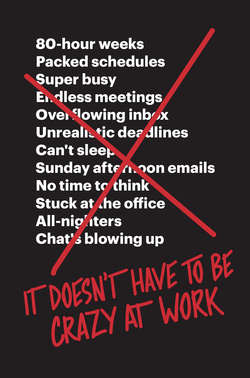Читать книгу It Doesn’t Have to Be Crazy at Work - Jason Fried, Jason Fried - Страница 5
Curb Your Ambition
Happy pacifists
ОглавлениеThe business world is obsessed with fighting and winning and dominating and destroying. This ethos turns business leaders into tiny Napoleons. It’s not enough for them to merely put their dent in the universe. No, they have to fucking own the universe.
Companies that live in such a zero-sum world don’t “earn market share” from a competitor, they “conquer the market.” They don’t just serve their customers, they “capture” them. They “target” customers, employ a sales “force,” hire “headhunters” to find new talent, pick their “battles,” and make a “killing.”
This language of war writes awful stories. When you think of yourself as a military commander who has to eliminate the enemy (your competition), it’s much easier to justify dirty tricks and anything-goes morals. And the bigger the battle, the dirtier it gets.
Like they say, all’s fair in love and war. Except this isn’t love, and it isn’t war. It’s business.
Sadly, it’s not easy to escape the business tropes of war and conquest. Every media outlet has a template for describing rival companies as warring factions. Sex sells, wars sell, and business battles serve as financial-page porn.
But that paradigm just doesn’t make any sense to us.
We come in peace. We don’t have imperial ambitions. We aren’t trying to dominate an industry or a market. We wish everyone well. To get ours, we don’t need to take theirs.
What’s our market share? Don’t know, don’t care. It’s irrelevant. Do we have enough customers paying us enough money to cover our costs and generate a profit? Yes. Is that number increasing every year? Yes. That’s good enough for us. Doesn’t matter if we’re 2 percent of the market or 4 percent or 75 percent. What matters is that we have a healthy business with sound economics that work for us. Costs under control, profitable sales.
Further, as far as market share goes, you’d need to define the market size accurately to define your share of it. As of the printing of this book, we have more than 100,000 companies that pay on a monthly basis for Basecamp. And that generates tens of millions of dollars in annual profit for us. We’re pretty sure that’s barely a blip of the overall market and that’s just fine with us. We’re serving our customers well, and they’re serving us well. That’s what matters. Doubling, tripling, quadrupling our market share doesn’t matter.
Lots of companies are driven by comparisons in general. Not just whether they’re first, second, or third in their industry, but how they stack up feature for feature with their closest competitors. Who’s getting which awards? Who’s raising more money? Who’s getting all the press? Why are they sponsoring that conference and not us?
Mark Twain nailed it: “Comparison is the death of joy.” We’re with Mark.
We don’t compare. What others do has no bearing on what we’re able to do, what we want to do, or what we choose to do. There’s no chase at Basecamp, no rabbit to pursue. Just a deep satisfaction with doing our very best work as measured by our happiness and our customers’ purchases.
The only things we’re out to destroy are outmoded ideas.
The opposite of conquering the world isn’t failure, it’s participation. Being one of many options in a market is a virtue that allows customers to have a real choice. If you can embrace that, then the war metaphors of business can more easily be buried, as they should be.
Because at the end of the day, would you rather win an imaginary contest by throwing sand in your competitors’ faces or by simply forgetting about them and making the best damn product you know how?
